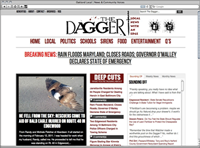Goodman got his start at The Aegis, a community paper based in Bel Air, Maryland. He stayed with its publishing company for the better part of a decade before leaving the newspaper industry in 2007 after a two-year stint as editor of one of the company’s related, smaller papers. He remained in close contact with his former colleagues and sources, however, trading news tips over e-mails, barroom conversations, and backyard BBQs. Realizing that much of the newsworthy information being exchanged was not being reported, he decided to establish his own site. As he explained to a reporter for the Baltimore Sun in March of 2009, “”It’s like an itch…You can’t get the ink out of our blood.”
Though The Dagger is an incorporated, for-profit business, its editor/owners are more interested in itch-scratching than profits. The members of the three-person staff–Goodman, who acts as executive editor, news editor Aaron Cahall, and education editor Cindy Mumby–each maintain day jobs while collectively working on the site in their off hours. The site operates as an LLC and each editor owns a stake in the company. The three are Harford County locals, and covering their respective beats is often indistinguishable from living their daily lives. As Cahall explains, “We don’t have that hamster wheel kind of coverage of just grinding it out, getting everything, and just killing ourselves trying to do it. There are certainly stories we push to get, but most of it is very ad hoc.”
Cahall feels that this style of reporting facilitates a more organic relationship to the community than that held by a full-time reporter. “We happen to be there because we’re connected with these people,” he says. “We are a part of the community. We see them at BBQs and street fairs and things like that.”
Since its founding, The Dagger’s editors have worked to recreate the experience of neighborly conversation online. Cahall believes that The Dagger’s focus on reader comments and contributions sets the site apart from other local outlets. “I think what’s made us as successful as we’ve been, with 30,000 unique visitors a months and about 150,000 page reads, is reader involvement,” he says. “More than anything, I consider that the true value of what we do.” One such example was a submission from a local teacher who argued for the need to properly fund the Harford school system. The article sparked an instant dialogue, generating over 150 comments within a week of being posted. The Dagger doesn’t want to simply publish information; it wants to foster conversation in real time.
The Dagger does its own fair share of reporting as well. After other news outlets reported that the county’s 2011 budget included a pay freeze for teachers, education editor Mumby discovered that the budget in fact included a two percent pay cut. This story generated public outcry, causing, as Cahall says, literally “hundreds of teachers” to descend upon the next school board meeting. Another Dagger scoop involved local law enforcement implicated in a theft scheme.
Some Dagger stories have had statewide impact. When a police officer’s widow wrote the Dagger that her sons had been put on a wait list for a fallen police officer’s scholarship because the scholarship was not being properly funded, the Dagger brought the story to light and local outcry ensued, causing Maryland governor Martin O’Malley to fully fund the program.
With all this momentum, might The Dagger make the leap from passion project to full-on news enterprise? The site sells ads to local businesses as a means of offsetting costs, but has not focused heavily on generating revenue. Cahall approaches the subject of expanding the site cautiously. “Until we know what the local market will bear, we have no idea if it’s even possible for the site to make enough money to let us all quit our day jobs,” he says. For now, the Dagger will continue purely as a community forum fueled by volunteers passionate about journalism. Is that enough? Apparently so.
 BEL AIR, MARYLAND — Harford County, Maryland-based journalist Brian Goodman wanted to start a band. He had a name picked out: The Dagger. After plans for the band fizzled, Goodman decided to take the name and start a local news blog instead. The journalistic ensemble known as The Dagger officially debuted in April of 2007, and has since evolved into a popular alternative news resource for Harford County, attracting an audience upwards of 30,000 unique visitors a month in a county with a population just over 200,000.
BEL AIR, MARYLAND — Harford County, Maryland-based journalist Brian Goodman wanted to start a band. He had a name picked out: The Dagger. After plans for the band fizzled, Goodman decided to take the name and start a local news blog instead. The journalistic ensemble known as The Dagger officially debuted in April of 2007, and has since evolved into a popular alternative news resource for Harford County, attracting an audience upwards of 30,000 unique visitors a month in a county with a population just over 200,000.
